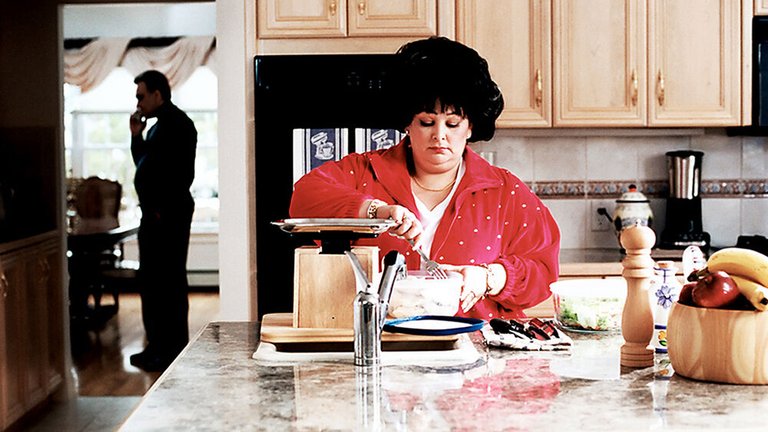
The Weight (S04E04)
Airdate: October 6th 2002
Written by: Terence Winter
Directed by: Jack Bender
Running Time: 58 minutes
Every long-running television drama reaches a nebulous midpoint in its narrative arc, a moment that, in retrospect, signals a subtle shift towards its eventual conclusion. However, pinpointing this juncture during the show’s original run is notoriously challenging, not least because even its creators often lack a definitive end date. Such episodes rarely telegraph their significance through overt climactic turns or a dip in quality, instead functioning as understated pivots where thematic undercurrents begin to coalesce. In The Sopranos, this midway milestone could have been The Weight, the fourth episode of Season 4.
Following an episode preoccupied with themes of group loyalty and cultural belonging (Christopher), The Weight turns inward, probing how individual vulnerabilities can spiral into existential threats for the DiMeo and Lupertazzi families. The episode posits that in the high-stakes world of organised crime, personal grievances are never merely personal; they metastasise, threatening hierarchies and livelihoods.
Central to the episode is the clash between New York’s Johnny Sack (played by Vincent Curatola) and New Jersey’s Ralph Cifaretto (played by Joe Pantoliano), ignited by Ralph’s crass joke about Sack’s wife, Ginny (played by Denise Borino). The insult, relayed to Johnny by the ever-meddlesome Paulie Gualtieri, festered until a chance encounter with Ralph’s associate, Donny Kafranza (played by Raymond Franza), triggers Johnny’s violent outburst. This uncharacteristic loss of composure—culminating in Donny’s brutal beating—exposes the fragility of Johnny’s self-image as a refined, detached leader. His subsequent demand for Ralph’s execution, rebuffed by both Tony Soprano and New York boss Carmine Lupertazzi, lays bare the tension between mob pragmatism and personal vendettas.
Tony and Carmine, recognising Ralph’s value to the Esplanade construction project, dismiss Johnny’s bloodthirsty ultimatum, offering financial reparations instead. Yet Johnny’s wounded pride proves immune to monetary salves, forcing Carmine to reluctantly greenlight a hit on his own underboss. The absurdity of this brinkmanship—escalating over a joke—underscores the precariousness of mob alliances, where ego and perceived disrespect can override cold logic.
The resolution, however, hinges on Johnny’s unexpected moment of clarity. Returning home to find Ginny secretly indulging in sweets, he confronts her weight not as a mark of shame but as an intrinsic part of her humanity. This epiphany—that love transcends superficial slights—persuades him to stand down, accepting Ralph’s belated apology. The sequence is a masterclass in subtlety, with Curatola’s nuanced performance conveying a lifetime of repressed vulnerability. Johnny’s arc, while ostensibly about mob politics, becomes a meditation on marital devotion and the quiet courage to defy toxic masculinity.
Parallel to Johnny’s turmoil is Carmela’s (played by Edie Falco) bid for financial independence—a subplot simmering with unspoken despair. Her pursuit of a real estate licence and consultations with cousin Brian Camaratta (played by Matthew Del Negro) reflect a burgeoning awareness of her gilded cage, yet Tony’s indifference to her efforts underscores the futility of her aspirations. More damningly, the episode charts her growing attraction to Furio Giunta (Federico Castelluccio), whose juxtaposition of brute strength and domestic tenderness (gardening, winemaking) highlights Tony’s emotional sterility. The closing scene—Carmela mechanically coupling with Tony while fantasising about Furio—is a devastating portrait of marital dissonance. Her rebellion remains internalised, a silent scream against the confines of her role as mob wife.
The Weight is a meticulously crafted episode, weaving multiple plotlines with the show’s signature blend of psychological acuity and dark humour. However, it occasionally strains credulity, particularly in its reliance on contrived coincidences. The chance meeting between Dr. Kupferberg (played by Peter Bogdanovich) and Tony in a car park, or Meadow’s recruitment into a legal aid programme by Kupferberg’s daughter, Sasha (played by Julie Goldman), feel overly orchestrated, serving more as narrative shortcuts than organic developments. Such moments, while minor, momentarily puncture the show’s otherwise immersive realism.
Similarly, the introduction of the Galinas—a geriatric hit squad led by the half-blind Lou “Di Maggio” Galina (played by Joseph Castellana)—veers into cartoonish excess. Their brief, darkly comic appearance (a nod to Grumpy Old Hitmen tropes) clashes tonally with the episode’s psychological gravity. Though intended to inject levity, the subplot ultimately feels superfluous, a detour that neither advances the plot nor enriches thematic depth.
Critics might argue that the episode’s central conflict—Johnny’s near-war over a joke—stretches believability, given his prior portrayal as a composed, strategic thinker. Yet this apparent inconsistency is precisely the point. The Sopranos excels in subverting archetypes, revealing how even “princely” figures like Johnny are susceptible to vanity and insecurity. His irrationality, juxtaposed against Tony’s reluctant pragmatism (despite his loathing for Ralph), underscores a key theme: in the mob, survival often demands the suppression of personal desires for collective gain.
Terence Winter’s script salvages potential contrivances by rooting Johnny’s rage not in mere pride, but in genuine love for Ginny. His eventual capitulation, prompted by a moment of marital tenderness, humanises him, contrasting sharply with Tony’s transactional worldview. This duality—honouring personal loyalty versus organisational duty—becomes a recurring tension, foreshadowing future fractures within both families.
The Weight epitomises The Sopranos’ ability to balance grand operatic stakes with intimate character studies. While occasional narrative shortcuts and tonal missteps mar its execution, the episode remains a pivotal turning point, exposing the fault lines beneath the mob’s veneer of control. Johnny Sack’s journey from wrath to reconciliation, coupled with Carmela’s stifled yearning, encapsulates the series’ core tragedy: that in a world governed by violence and avarice, even love becomes a liability. As the midpoint of the series, it signals the beginning of the end—not through explosive climaxes, but through the quiet unravelling of its characters’ fragile façades.
RATING: 6/10 (++)
Blog in Croatian https://draxblog.com
Blog in English https://draxreview.wordpress.com/
InLeo blog https://inleo.io/@drax.leo
InLeo: https://inleo.io/signup?referral=drax.leo
Hiveonboard: https://hiveonboard.com?ref=drax
Rising Star game: https://www.risingstargame.com?referrer=drax
1Inch: https://1inch.exchange/#/r/0x83823d8CCB74F828148258BB4457642124b1328e
BTC donations: 1EWxiMiP6iiG9rger3NuUSd6HByaxQWafG
ETH donations: 0xB305F144323b99e6f8b1d66f5D7DE78B498C32A7
BCH donations: qpvxw0jax79lhmvlgcldkzpqanf03r9cjv8y6gtmk9